Dark Shadows (2012)

Dark Shadows (2012): Tim Burton’s Gothic Comedy Reimagining of a Cult Classic
Released on May 11, 2012, Dark Shadows is a gothic horror-comedy directed by Tim Burton, adapting the iconic 1966–1971 ABC soap opera of the same name. Starring Johnny Depp as Barnabas Collins, a vampire navigating the eccentricities of his dysfunctional family in 1972, the film blends Burton’s signature whimsical darkness with campy humor and supernatural drama. Produced by Warner Bros. and Village Roadshow Pictures, Dark Shadows grossed $245.5 million worldwide but received mixed reviews, earning a 35% approval rating on Rotten Tomatoes. Despite its polarizing reception, the film’s star-studded cast, lavish production design, and nostalgic nod to the original series have cemented its place as a cult favorite. This article explores the film’s origins, creative team, plot, production, critical response, and enduring legacy.
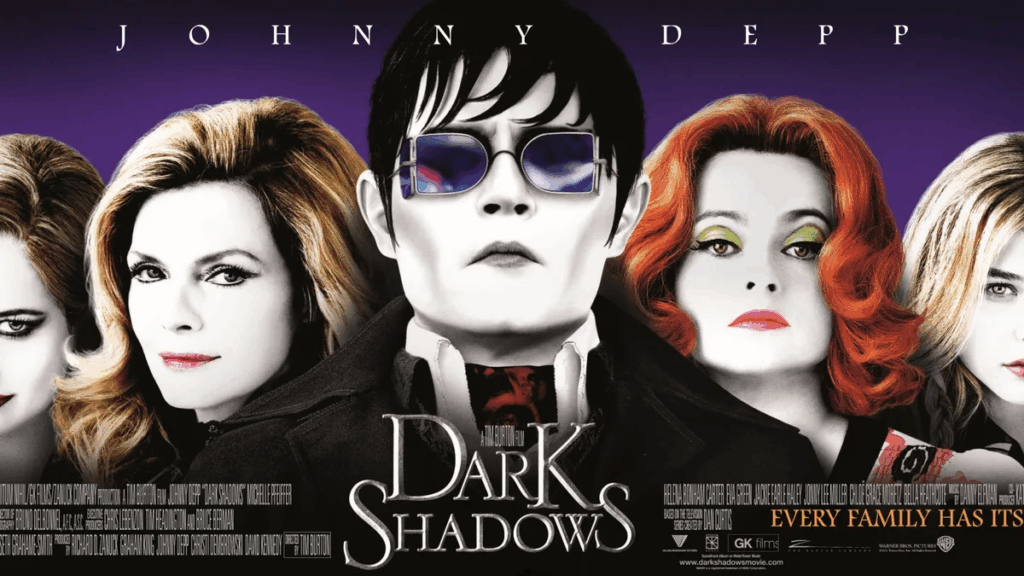
Origins and Inspiration
Dark Shadows began as a groundbreaking daytime soap opera created by Dan Curtis, airing on ABC from 1966 to 1971. The series, spanning 1,225 episodes, was a unique blend of gothic romance, supernatural horror, and melodrama, introducing vampire Barnabas Collins (originally played by Jonathan Frid) as a tragic antihero. The show’s cult status, fueled by its mix of vampires, witches, and time-travel arcs, made it a cultural phenomenon, spawning two feature films in the 1970s (House of Dark Shadows and Night of Dark Shadows), TV revivals in 1991 and 2004, and a dedicated fanbase.
The idea for a 2012 film adaptation emerged from Johnny Depp, a lifelong fan of the series, who acquired the rights through his production company, Infinitum Nihil. Depp’s passion for Barnabas Collins, whom he described as a “tragic, romantic figure,” drove the project, with Tim Burton, his frequent collaborator, signing on to direct. The film aimed to honor the soap opera’s gothic roots while infusing Burton’s quirky humor and visual flair, targeting both nostalgic fans and new audiences. Screenwriter Seth Grahame-Smith, known for Abraham Lincoln: Vampire Hunter, crafted a script that balanced the series’ sprawling mythology with a standalone narrative set in the 1970s.
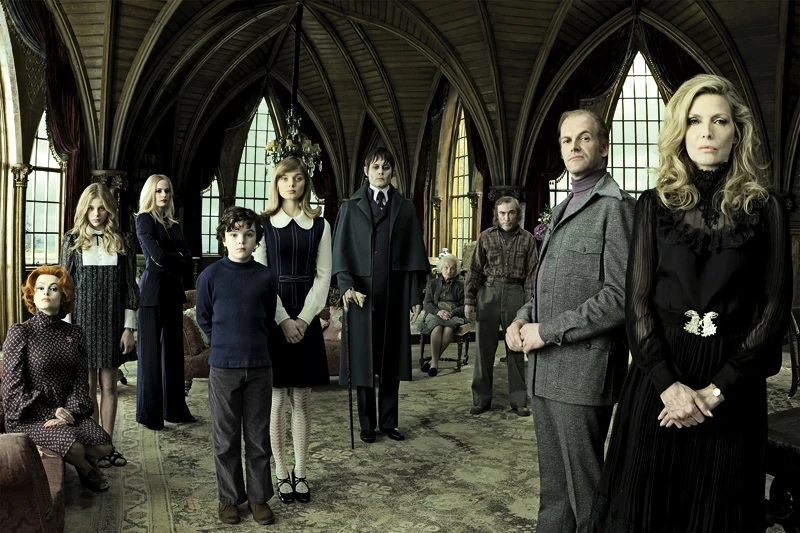
Plot and Structure
Dark Shadows follows Barnabas Collins (Johnny Depp), an 18th-century playboy cursed into vampirism by the witch Angelique Bouchard (Eva Green) after spurning her love. In 1752, Angelique kills Barnabas’s fiancée, Josette (Bella Heathcote), and imprisons him in a chained coffin. Two centuries later, in 1972, Barnabas is unearthed in Collinsport, Maine, and returns to his ancestral home, Collinwood Manor. He finds his once-thriving family in decline, led by matriarch Elizabeth Collins Stoddard (Michelle Pfeiffer) and including her rebellious daughter Carolyn (Chloë Grace Moretz), troubled nephew David (Gulliver McGrath), and David’s father, Roger (Jonny Lee Miller).
Barnabas, grappling with his vampiric nature and the modern world, vows to restore the Collins family’s fishing empire, which is under threat from Angelique’s rival cannery. He befriends David’s governess, Victoria Winters (also played by Heathcote, echoing Josette), sparking a romance haunted by his past. The household is rounded out by Dr. Julia Hoffman (Helena Bonham Carter), a psychiatrist with her own agenda, and Willie Loomis (Jackie Earle Haley), the manor’s drunken caretaker. As Barnabas navigates family dysfunction, 1970s culture clashes, and Angelique’s vengeful schemes, the film unfolds as a darkly comedic fish-out-of-water tale, culminating in a supernatural showdown revealing secrets like Carolyn’s werewolf curse and Angelique’s demonic origins.
The narrative blends gothic horror—vampire bites, ghostly apparitions—with slapstick humor, such as Barnabas’s bewilderment at lava lamps and Alice Cooper (playing himself in a cameo). While staying true to the soap opera’s supernatural elements, the film leans into comedy, diverging from the series’ melodramatic tone.
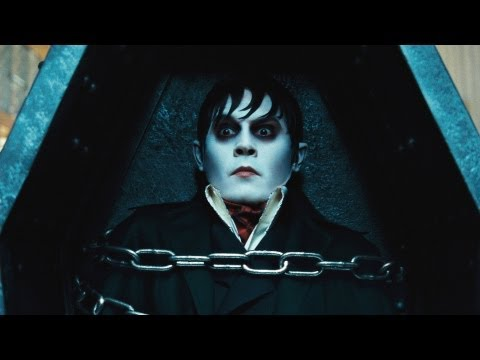
Creative Team and Cast
Directed by Tim Burton, Dark Shadows marks his eighth collaboration with Johnny Depp, following hits like Edward Scissorhands (1990) and Sweeney Todd (2007). Depp, also a producer, delivers a theatrical performance as Barnabas, blending pathos with comedic awkwardness. The ensemble cast is a highlight: Michelle Pfeiffer as the steely Elizabeth, Eva Green as the seductive yet unhinged Angelique, and Helena Bonham Carter as the eccentric Dr. Hoffman. Bella Heathcote shines in dual roles as Victoria and Josette, while Chloë Grace Moretz and Jonny Lee Miller add depth to the dysfunctional Collins family. Jackie Earle Haley’s Willie and Christopher Lee’s cameo as a fisherman enhance the quirky roster.
The production team includes cinematographer Bruno Delbonnel, whose moody visuals capture Collinwood’s gothic decay, and production designer Rick Heinrichs, a Burton regular, who crafted the film’s retro-1970s aesthetic. Danny Elfman’s score, blending eerie orchestration with period-appropriate rock, complements the film’s tone, while the soundtrack features 1970s hits like The Carpenters’ “Top of the World” and Donovan’s “Season of the Witch.” Costume designer Colleen Atwood created iconic looks, from Barnabas’s anachronistic attire to Angelique’s vibrant dresses, earning an Oscar nomination.

Production Details
Development began in 2007, with filming taking place in 2011 across Pinewood Studios in England and locations in Canada. The $150 million budget supported elaborate sets, including a reconstructed Collinwood Manor, and extensive CGI for supernatural effects like Angelique’s porcelain-cracking transformation and ghostly apparitions. Burton aimed to balance fidelity to the soap opera with a fresh, comedic spin, though he faced challenges condensing the series’ sprawling mythology into a 113-minute runtime.
The film’s tone was a point of contention. Burton and Depp opted for a lighter, campier approach than the soap opera’s somber drama, drawing inspiration from the 1970s setting and Burton’s love for B-movie aesthetics. This shift alienated some fans expecting a darker adaptation, as noted in contemporary reviews. The film was rated PG-13, with mild violence and suggestive humor, making it accessible but less intense than the R-rated Sweeney Todd.
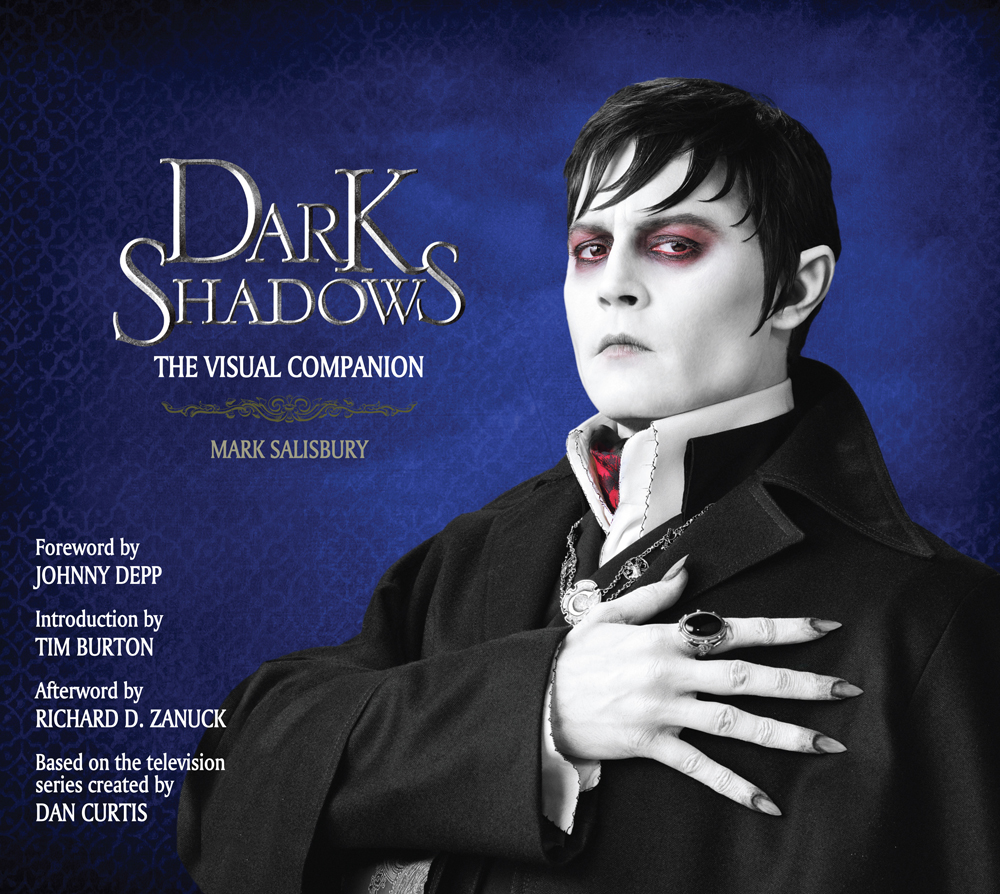
Critical Reception and Controversy
Upon release, Dark Shadows received mixed reviews, earning a 35% approval rating on Rotten Tomatoes based on 264 reviews. Critics praised its visual flair, cast chemistry, and Burton’s gothic aesthetic but criticized its uneven tone, convoluted plot, and departure from the soap opera’s gravitas. Roger Ebert gave it 2.5/4 stars, noting it was “better than it might have been” but lacked focus, while The Guardian’s Peter Bradshaw called it “a muddled, campy mess” despite Depp’s charm. Eva Green’s unhinged performance as Angelique was a standout, with reviewers like Variety’s Justin Chang lauding her “deliciously over-the-top” villainy.
Fans of the original series, active on platforms like the Dark Shadows fan communities referenced in web results, were divided. Some appreciated the nostalgic references—like the Collinsport setting and cameos from original cast members Jonathan Frid, Lara Parker, David Selby, and Kathryn Leigh Scott in a party scene—while others felt the comedic tone betrayed the soap opera’s emotional depth. The film’s box office performance, grossing $245.5 million against a $150 million budget, was solid but underwhelming compared to Burton’s Alice in Wonderland (2010), which earned over $1 billion.
Controversy also arose over the film’s marketing, which emphasized comedy over horror, misleading audiences expecting a traditional Burton gothic tale. Posts on X from 2012, archived in web results, reflect fan debates over whether the film respected the source material or leaned too heavily into parody.

Themes and Interpretation
Dark Shadows explores themes of family dysfunction, redemption, and the clash between past and present. Barnabas, a man out of time, grapples with his cursed immortality and desire to protect his family, echoing the soap opera’s tragic hero. The 1970s setting amplifies the fish-out-of-water humor, with cultural references like hippies and disco balls juxtaposing Barnabas’s 18th-century sensibilities. The film critiques greed and betrayal through Angelique’s corporate machinations and the Collins family’s internal strife, while Victoria’s romance with Barnabas offers a hopeful, if doomed, thread of love.
The comedic tone, however, dilutes the gothic horror, leading some critics, like The New York Times’ Manohla Dargis, to argue it “mocks what it should celebrate.” The film’s blend of camp and sincerity invites varied readings: a satire of soap opera tropes, a love letter to gothic fiction, or a commentary on legacy and reinvention. Burton’s visual motifs—foggy cliffs, candlelit manors—reinforce the gothic atmosphere, while the humor reflects his playful take on genre conventions.
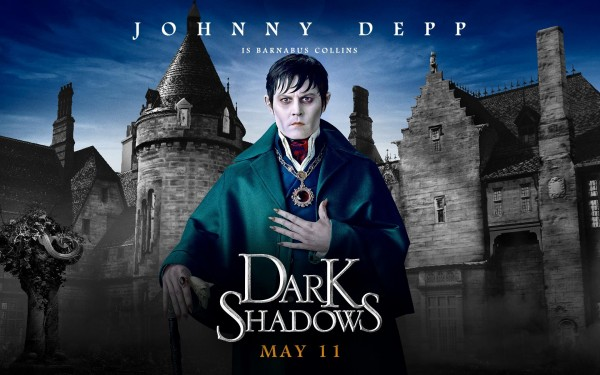
Legacy and Reappraisal
Despite its mixed reception, Dark Shadows has cultivated a cult following, particularly among Burton fans and younger viewers discovering the film on streaming platforms like Max or Blu-ray. Its vibrant visuals, memorable performances (especially Green’s Angelique), and 1970s nostalgia resonate with audiences who appreciate its offbeat charm. The film’s influence is seen in later gothic-comedy hybrids, and its soundtrack remains a fan favorite, with covers like Iggy Pop’s “I’m Sick of You” gaining renewed attention.
The #ReleaseTheBurtonCut movement, though less prominent than for other directors, has surfaced on X, with fans speculating about deleted scenes that might restore a darker tone. The Blu-ray includes behind-the-scenes featurettes and deleted scenes, offering insight into Burton’s vision. The film also revitalized interest in the original series, prompting new fans to explore the 1960s soap opera through DVD collections or streaming.
In Burton’s filmography, Dark Shadows sits as a divisive but ambitious entry, bridging his early gothic works (Beetlejuice, Sleepy Hollow) with his later, more commercial projects (Dumbo). While not as revered as Edward Scissorhands, it showcases his ability to blend genres and collaborate with Depp, whose performance remains a highlight.
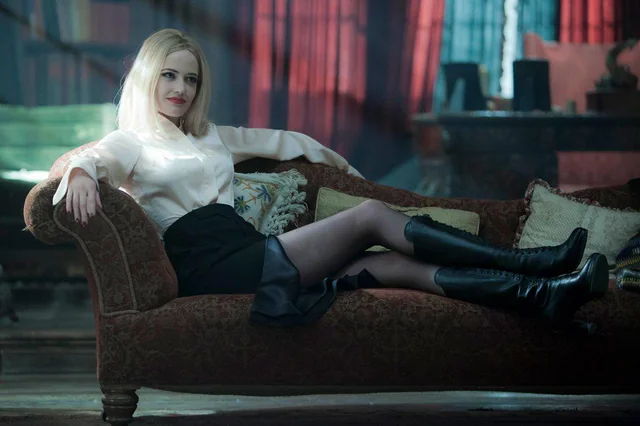
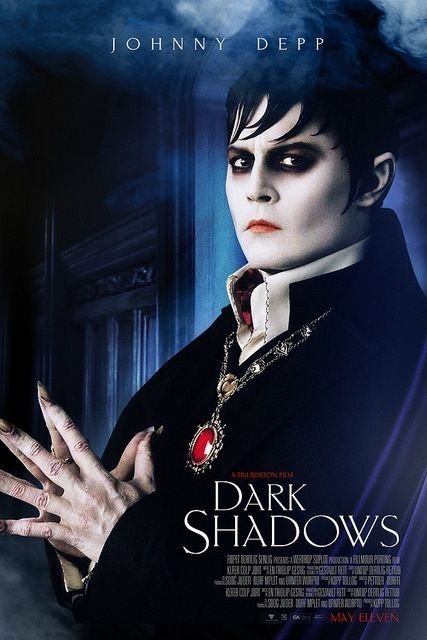
Conclusion
Dark Shadows (2012) is a bold, flawed reimagining of a television classic, blending Tim Burton’s gothic whimsy with campy humor and a stellar cast. Johnny Depp’s Barnabas Collins anchors a visually stunning but narratively uneven tale of vampires, witches, and family dysfunction. Despite mixed reviews and fan debates over its comedic tone, the film’s lavish production, evocative score, and nostalgic nods to the 1966–1971 soap opera ensure its place in Burton’s oeuvre. For those intrigued by its quirky charm, Dark Shadows is available on streaming platforms or Blu-ray, offering a gothic escape into Collinsport’s shadowy world. Fans can also explore the original series or join online communities to discuss its legacy, keeping the Collins family’s saga alive.